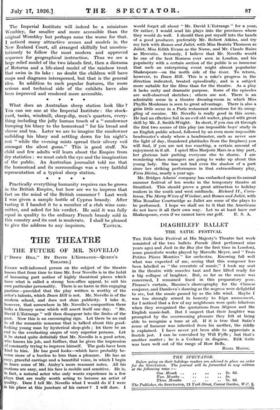THE THEATRE
THE FUTURE OF MR. NOVELLO
r DOWN HILL." BY DAVID L'ESTRANGE—QUEEN'S
THEATRE.]
EVERY well-informed person on the subject of the theatre knows that from time to time Mr. Ivor Novello is in the habit of becoming part author of highly theatrical pieces which have what is called a strong box-office appeal, to suit his own particular personality. There is no harm in this engaging pastime—provided that the play written is worthy of the actor's talents, which Down Hill is not. Mr. Novello is of the modern school, and does not shun publicity. I take it, however, that somewhere in Mr. Novello's composition there lurks a literary sense which will assert itself one day. " Mr. David L'Estrange " will then disappear into the limbo of the past. Now this is an encouraging sign. Let there be an end to all the romantic nonsense that is talked about this good- looking young man by hysterical shop-girls ; let there be an end to the everlasting sneers of very superior persons. Let it be stated quite definitaly that Mr. Novello is a good actor, who knows his job, and further, that he gives the impression of constantly trying to improve himself. The gods have been kind to him. He has good looks—which have probably be- come more of a burden to him than a pleasure. He has an easy, graceful carriage and a beautiful voice, in which I begin to trace some of Mr. Ainley's more resonant notes. All his motions are easy, and his face is mobile and sensitive. He is, in fact, a natural actor who only wants experience in a few Plays that are really worth acting to become an artist of quality. Dare I tell Mr. Novello what I would do if I were in his place at this juncture of his career ? I will dare. I would forget all about " Mr. David L'Estrange " for a year. Or rather, I would Send -his plays into the provinces where they would do well. I should then put myself into the hands of a good producer, preferably Mr. Robert Atkins, and try my luck with Romeo and Juliet, with Miss Beatrix Thomson as Juliet, Miss Edith Evans as the Nurse, and Mr. Claude Rains as Mercutio. Seriously,' I believe that Mr. Novello would be one of the best Romeos ever seen in London, and his popularity with a certain section of the public is so immense that such an enterprising event might almost popularize Shakespeare—on the north side of the river. To return, however, to Down Hill. This is a rake's progress in the direction indicated, treated episodically, and is a subject more suitable for the films than for the theatre. As a play it lacks unity and dramatic purpose. Some of the episodes are well-observed sketches ; others are not. There is an admirable scene in a theatre dressing-room in which Miss Phyllis Monkman is seen to great advantage. There is also a grim little scene in a Paris restaurant notorious for its smug- gling of cocaine. Mr. Novello is really good in this scene. He had an effective foil in an evil old waiter, played with great skill by Mr. J. Smith-Wright. In short, if you can sit through the first two scenes of this play (an impossible boys' study in an English public school, followed by an even more impossible headmaster's study where a headmaster, such as never saw the light of day, thundered platitudes from the fireplace) you will find, if you are not too exacting, a certain, amount of enjoyment in it all. I spied Miss Marjorie Mars in a tiny part, her glorious hair putting everyone else to shame. I am wondering when managers are going to wake up about this young lady. She has not had even the shadow of a part since her striking performance in that extraordinary play, Fires Divine, nearly a year ago.
Mr. Bridges Adams' company has embarked upon its annual summer festival of ten weeks in the temporary theatre at Stratford. This should prove a great attraction to holiday makers in the south and west midlands. Richard II., Corio- lanus, The Merry Wives of Windsor, and Row() and Juliet, with Miss Rosaline Courtneidge as Juliet are some of the plays to be -performed. I hope we shall see to it that the Americans do not have it all their own way. Let us at least have our
Shakespeare, even if we cannot haVe our golf. E. S. A.










































 Previous page
Previous page